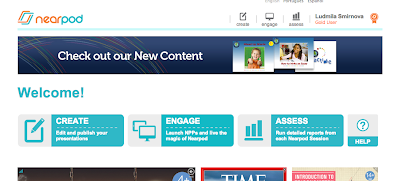I love attending the EdMedia conferences. I have attended them probably four or five times. I enjoy the spirit, its friendly atmosphere, creative interaction and tracks it offers. I presented papers, co-presented a paper with my Russian colleague last year; ran workshops two times, one with Dr. Nellie Deutsch, one (last year) by myself and have just submitted 3 proposals for the summer of 2014. A workshop on Moodle and WizIQ with and for Best Practices presentation with Nellie and one proposal with one of my research students who completed a summer research (SURE) project last summer about iPads.
I posted a video-promotion about it on a new website called FipGrid. View it on the flipgrid site. I am there among four male educators who are planning to attend the conference and shared their experience with EdMedia. EdMedia 2014 org committee posted the links to EdMedia Facebook page, and added a hashtag for Twitter #edmedia on the main AACE conference website. That's how I found a FlipGrid greeting invitation.
But this blog is more about my collaboration with one of my research students, Lindsay Bordonaro.
We worked during the summer of 2013 on the project titled "iPadagogy: The Expanding Use of iPads in the Elementary Classrooms." She and Clarisa Rosario surveyed 50 teachers about how teachers use Web 2.0 and iPads in their classrooms. During May Lindsay and Clarisa created Google doc Survey of 43 questions and offered it to teachers from different school districts in June and followed up the survey with face-to-face interviews with a few teachers. Of course, it was very hard to do because of the end of the semester. In July - August they both worked on the survey data, analyzing the results and designing the poster presentation for the college Symposium that was held in September.

I also encouraged both Lindsay and Clarisa to present at the virtual MoodleMoot conference in August. They both were brave enough to participate among experience educators and presenters.
I am excited about the possibility to bring a student to EdMedia conference. Lindsay's mother bought her a mini-iPad so that Lindsay could try the Apps out during her student teaching. Exciting!
More work if we are accepted. I am collecting the blogs of teachers who are using iPads in their classrooms. So much to analyze and learn from! Below is one:
iPads Improve Classroom Learning, Study Finds
I posted a video-promotion about it on a new website called FipGrid. View it on the flipgrid site. I am there among four male educators who are planning to attend the conference and shared their experience with EdMedia. EdMedia 2014 org committee posted the links to EdMedia Facebook page, and added a hashtag for Twitter #edmedia on the main AACE conference website. That's how I found a FlipGrid greeting invitation.
But this blog is more about my collaboration with one of my research students, Lindsay Bordonaro.
We worked during the summer of 2013 on the project titled "iPadagogy: The Expanding Use of iPads in the Elementary Classrooms." She and Clarisa Rosario surveyed 50 teachers about how teachers use Web 2.0 and iPads in their classrooms. During May Lindsay and Clarisa created Google doc Survey of 43 questions and offered it to teachers from different school districts in June and followed up the survey with face-to-face interviews with a few teachers. Of course, it was very hard to do because of the end of the semester. In July - August they both worked on the survey data, analyzing the results and designing the poster presentation for the college Symposium that was held in September.

I also encouraged both Lindsay and Clarisa to present at the virtual MoodleMoot conference in August. They both were brave enough to participate among experience educators and presenters.
I am excited about the possibility to bring a student to EdMedia conference. Lindsay's mother bought her a mini-iPad so that Lindsay could try the Apps out during her student teaching. Exciting!
More work if we are accepted. I am collecting the blogs of teachers who are using iPads in their classrooms. So much to analyze and learn from! Below is one:
iPads Improve Classroom Learning, Study Finds















